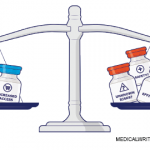It seems to have begun in Norway, the international pressure to switch patients from well-known brand biologic agents, such as Remicade (infliximab), to biosimilar agents, due to a significant cost advantage.1
This biosimilar came with a 39% price markdown last year compared with the brand, and when Norway called for bids, the discount went to 69% of the drug’s original $10,500/year price tag. In Norway, the medical director of the Norwegian Medicines Agency felt like he was throwing away money by using the innovator product Remicade when the biosimilar product was 69% less. So doctors couldn’t ignore the price cut.
Pharmaceutical companies, such as Merck, want physicians to think first before prescribing biosimilar agents, because they don’t have the same safety records as the innovator products.1
Some European physicians are wary of changing patients from brand biological disease-modifying anti-rheumatic drugs (bDMARDs) to biosimilar DMARDs, and may decide to start only new patients on biosimilar DMARDs. In Portugal, position statements and guide- lines are recommending this strategy.
In an effort to resolve this dilemma, the Norwe- gian government is funding a study to evaluate patient response from switching between the rheumatoid arthritis (RA) blockbuster monoclonal antibody Remicade (infliximab, J&J/Merck) to Celltrion’s biosimilar Remsima (infliximab).2
Remsima or Inflectra are infliximab biosimilars available in many countries, including Canada, Japan, Korea, Norway, Finland, Ireland, Portugal and Columbia, and in Eastern Europe. A two-year Celltrion-funded study presented as a late-breaking poster at the ACR/ARHP Annual Meeting in San Diego on Oct. 29, 2013, showed similar response in patients with ankylosing spondylitis who switched to Remsima from Remicade after one year of treatment.3 Comparable efficacy and tolerability were also shown out to Week 102.
More recently, reported on Nov. 17, 2014, at the ACR/ARHP Annual Meeting in Boston, the pharmacokinetics, as well as comparable safety profiles, were observed between CT-P13 (Celltrion’s biosimilar infliximab) and both European- and U.S.-sourced infliximab.4 This study was a randomized, double-blind, three-arm, parallel-group, single-dose study in 213 healthy volun- teers. No serious adverse events were reported, and no adverse events led to study withdrawal.
Ixekizumab Met ACR20 in Late-Stage Psoriatic Arthritis Trial
Ixekizumab is a monoclonal antibody that binds to and neutralizes the proinflammatory cytokine, interleukin 17A (IL17A). Administered via the subcutaneous route, ixekizumab is currently in Phase 3 clinical trials for treating psoriatic arthritis (PsA). It’s also in clinical trials for treating moderate-to-severe plaque psoriasis. In the recent SPIRIT-P1 trial, ixekizumab was found statistically superior to placebo in achieving an ACR20.1 Patients with active PsA and who were naive to biological disease modifying antirheumatic drugs (bDMARDs) received one of two doses of ixekizumab or placebo for 24 weeks. All ixekizumab-treatment patients were initially started on 160 mg and were then switched to receive either 80 mg once every two weeks or once every four weeks. Adalimumab was used as an active control for comparison to placebo. Both ixekizumab dosage regimens performed better than placebo-treated patients.



